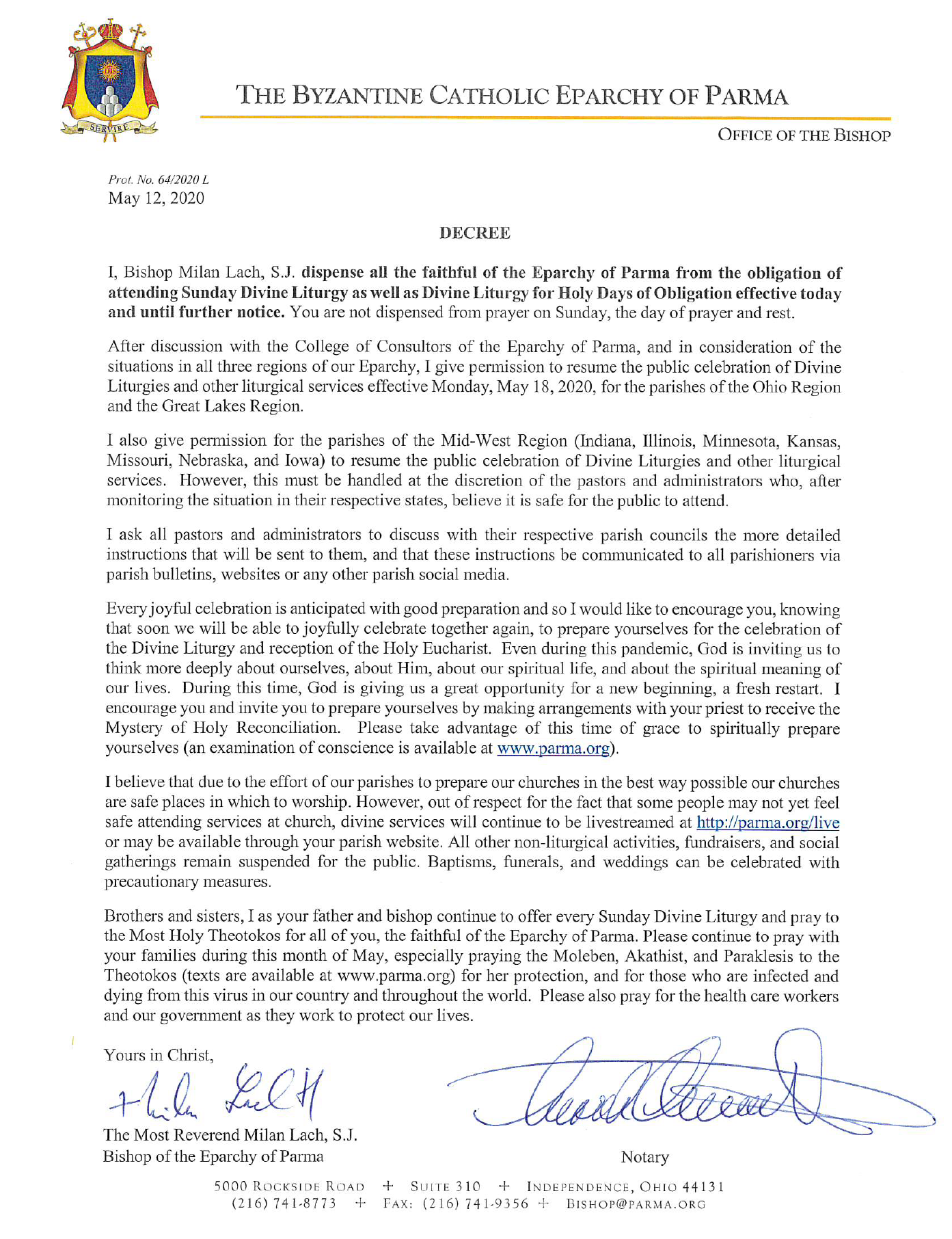Click here to watch a video of this service on YouTube (live stream begins at 9am, Friday, May 15th, 2020)
Vespers for Thursday of the Week of the Samaritan Woman
Click here to watch a video of this service on our YouTube channel. (Live stream will be at 7pm on May 13th, 2020)
Decree on Dispensation

Dear Parishioners & Friends of St. Stephen,
Thanks be to God, beginning Monday, May 18th, our liturgical celebrations will once again be open to the public. The dispensation from the obligation to attend Liturgy (either Vespers, Matins, or Divine Liturgy) for Sundays and Great Feasts remains in effect until further notice. No one is dispensed from prayer on the Lord’s Day, of course. Keep praying! If it has been more than a month since your last confession, make sure to go to confession before receiving holy communion. This, along with fasting and prayer, is a necessary step in preparing to receive holy communion. I am available for confession at the times listed in the bulletin and also by appointment.
Though we will once again be celebrating together, this will not be “back to normal.” Bishop Milan has given us many guidelines to follow when we reopen:
- Before each service, the church should be cleaned and sanitized – especially areas that are commonly touched (railings, doors, backs of pews, etc.) If anyone would like to volunteer to come early and assist with this and/or donate cleaning supplies, please let me know.
- I am to remove all the Holy Water containers and fountains. I will provide anyone with a container of holy water for their own use by request.
- I am to remove all the pew books and put them away. If you have your own pew book, feel free to bring it from home and take it back home with you. If you would like your own pew book, let me know and I’ll supply you with one.
- To assist with increasing ventilation and reducing frequently touched surfaces, the doors from the narthex into the nave will be kept open at all times.
- Every other pew will be blocked off with ribbon and spaces where people should sit in the pews will be marked. In the aisle is a single file row of marks 6 feet apart where you should stand as you approach to receive Holy Communion.
- You may sit close to the members of your own household, but keep 6 feet of distance away from others.
- You may venerate the icons, etc. by bowing rather than by kissing.
- All other types of gatherings, such as our coffee social, ECF, and adult classes remain cancelled.
- If you feel ill or have a fever, please stay at home. Even in ordinary times, there is no “obligation” to come to church while you are ill.
- If you have prepared to receive communion, when you approach, tilt your head back, open your mouth wide, do not say anything, and do not close your mouth upon the spoon. The spoon will be sanitized when needed by wiping it with a cloth soaked in pure alcohol. I will pray the prayer mentally, rather than out loud, as I give you communion.
- The ushers will not take up the collection, but baskets will be placed near the entrance where you can leave your offering. Please remember to support St. Stephen financially at this time.
- Celebration of baptisms, weddings, and funerals are allowed if all precautions listed above are observed.
- To help with keeping physical distance between people, please consider alternately attending Vespers or Matins or Divine Liturgy, rather than only the Divine Liturgy. Even in ordinary times, any of these three services fulfills your Sunday obligation.
- If you do not feel safe, remember that there is no obligation to attend church at this time. Rather, keep the day holy with prayer at home.
- Live streams of our liturgical services will continue.
God be with you all and I so look forward to seeing those of you who come!
In Christ,
Fr. John
First & Third Hour & Divine Liturgy for the Leave-taking of Mid-Pentecost
Click here to watch a video of this service on YouTube (live stream begins at 9am, Wednesday, May 13th, 2020)
FIRST HOUR PROPERS for Mid-Pentecost
Midpentecost Third Hour Propers
First & Third Hour for the 5th Tuesday of Pascha – Postfestive day of Mid-Pentecost
Click here to watch a video of this service on YouTube (live stream begins at 9am, Tuesday, May 12th, 2020)
- « Previous Page
- 1
- …
- 156
- 157
- 158
- 159
- 160
- …
- 190
- Next Page »
